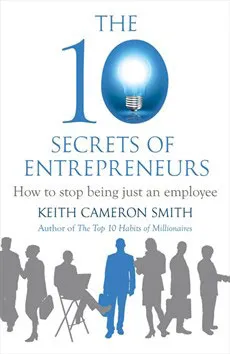[Book Review] The 10 Secrets of Entrepreneurs

- by Keith Cameron SmithAmazon | 2012 Piatkus
118 pages; 10 chapters
This slender book makes for a quick and easy read about what sets apart entrepreneurs from employees. In fact, this book first appeared as ‘The Top 10 Distinctions between Entrepreneurs and Employees,’ and has been cleverly re-packaged.
“Your mindset may be more important than your bank account as a measure of your financial future,” begins Sharon Lechter (co-author of ‘Rich Dad, Poor Dad’), in the book’s preface.
“If you want to impress someone you tell them about your successes, but if you want to impact someone you tell them of your failures,” says author Keith Cameron Smith, whose other books include “The Top 10 Habits of Millionaires” – see a pattern here?
The 10 chapters of the book are each devoted to one core feature of entrepreneurs, which I have summarised in Table 1 below. Most of the examples are drawn from the author’s own life experiences, but it would have been great to add other case studies from the business world as well.
Table 1: Entrepreneurs v/s Employees
Experience provides a curriculum for the entrepreneur unlike anything devised in the traditional school system, according to Smith; experience teaches you about failure, rejection, perseverance and attitude. Though there is nothing wrong in being an employee, the education system does not adequately cover the options for learners to become entrepreneurs.
“Failure is feedback. Failure is the opportunity to begin again in a new and better way. Failure is your friend. It is one of life’s many teachers,” Smith explains; unfortunately, many people take failure personally, or do not take responsibility for their failures.
Smith also advises entrepreneurs to build self-discipline and good daily habits to ensure that they manage personal and professional lives. “Peace of mind is a powerful state that allows creativity to flow,” he claims. Successful entrepreneurs are willing to do what is hard now so as to make life easier later. Entrepreneurs must learn to inspire others to get started, and encourage them to stay on the path; this applies to themselves too.
A good entrepreneur is always learning new things, way beyond normal ‘job descriptions.’ “The way you learn a little about a lot is simply to keep expanding your mind. People who don’t consistently increase their knowledge will always have low limits on the success they can achieve,” Smith says.
Successful entrepreneurs have learned to praise before they correct, and then praise again when they see improvement; they understand that correction is not rejection. Accepting and using correction from others requires one simple virtue: humility – to listen, accept, learn and grow. “Connect before you correct,” advises Smith; merely blaming and complaining are not constructive.
The book is packed with clever acronyms to tease apart personality types (DISC – dominant, inspirational, sincere, calculated), and implement appreciative behaviours (PCP – praise, correct, praise; or C3 – compliment, correct, compliment).
Taking positive steps towards one’s goals builds positive momentum, instead of a downward spiral. In the long run, building wealth takes more time, but making money can be done quickly. As for social habits, successful entrepreneurs invest their time with other successful people.
Though hindsight is useful, entrepreneurs do not let this bind them to the past alone, and are not haunted by regret, guilt or shame. Real success comes when the entrepreneurs are true to their personal values.
“If you create a vision of a future that you’d love to experience and then start running towards it, the successes and failures, victories and defeats will give you a rich and rewarding life,” Smith advises.
Entrepreneurs have faith in their vision, themselves, and their team, and are not plagued by self-doubt and fear of failure. “Risks taken in fear very often meet with failure,” Smith cautions. Entrepreneurs put faith even in failures, and believe that failures are teachers and friends. Some entrepreneurs even have a magical touch over and above perseverance and self-confidence in the face of a string of failures.
“Celebrate your successes. Your faith is your greatest asset. Feed it and find freedom,” Smith concludes.
[Follow YourStory's research director Madanmohan Rao on Twitter at @madanrao]


![[Book Review] The 10 Secrets of Entrepreneurs](https://images.yourstory.com/cs/wordpress/2012/10/secrets.jpg?mode=crop&crop=faces&ar=16%3A9&format=auto&w=1920&q=75)




